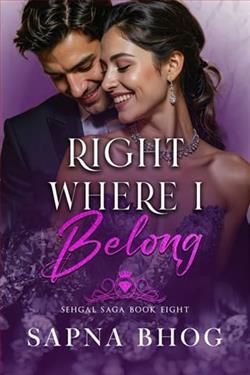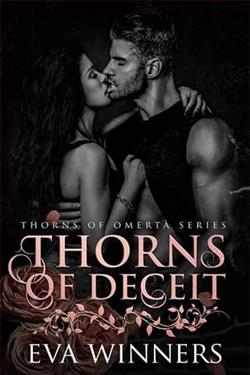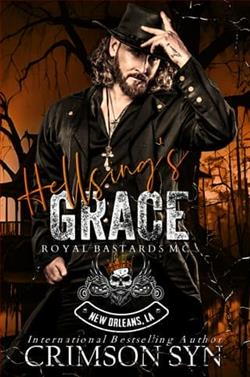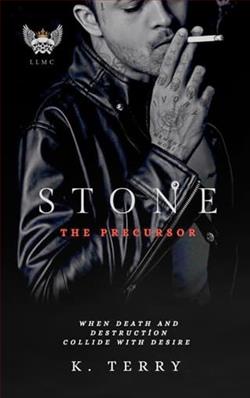Page 29 of Taming the Highland Misfits
However, she had been quicker than he expected, and now he was sitting in front of her trying to think of something—anything—to say that would get him out of the situation he found himself in. Eventually, he decided that there was only one thing to do. Isla deserved nothing less than the truth, and if she chose to disown him after that, so be it; he could not spend the rest of his life living a lie.
He took a deep breath and began to speak. “Isla, I have a confession tae make, an’ after I tell ye what it is, I promise I willnae blame ye if ye dinnae want tae have anythin’ tae dae wi’ me any more.” He stopped and looked into her eyes, pleading silently for her understanding.
“Go on,” Isla urged. “Tell me.” She was even more frightened now; was he going to tell her that he had just murdered someone? She eyed the poker on the floor, making sure she could reach it quickly if she had to.
“I lied tae ye,” Finley said dully. “I am no’ a blacksmith, Isla, no’ any more. I am a bandit. I rob coaches an’ people on horseback, an’ I have sometimes even broken intae people’s houses. But ye dinnae need tae tell me how disgustin’ I am, ‘cos I already know. I know it probably will no’ make ye think any better o’ me, but I have never, an’ will never lay a hand on a lady.”
“You do not steal from them?” Isla asked, trying desperately to find a glimmer of hope in what Finley was saying, trying to find some good in the horrible picture he was painting.
Finley leaned his elbows on his knees and buried his face in his hands, then looked at the floor as he spoke. He simply could not bear to meet Isla’s eyes. “I did steal fae them,” he confessed, “but I never laid a finger on them, an’ I stopped other men fae daein’ so.”
“So you are trying to tell me that it is all right to steal from both men and women,” Isla said in disbelief, “as long as you do not molest the women?”
Finley shook his head. “No, Isla,” he replied, sighing. “Stealin’ is never right—even I know that, but I was desperate. Ma had just died—ye know she worked at the tavern—and my Da wasnae fit tae be any help at all. He lost his job at Mullen’s farm because he was always drunk. He went out one night an’ never came back, an’ they found his body floatin’ on top o’ the River Leish a couple o’ months later.
I had been stayin’ wi’ my Auntie Bettie while he was missin’, an’ she was makin’ her livin’ as a herbalist, but she didnae earn much. I was just about gettin’ by at the blacksmith’s shop, so between us we managed tae scrape together enough money tae give him a decent funeral. After that though, we were hardly able tae light the cottage or buy extra food for a month. That is how bad things were.
I went out for a drink wi’ a pal one night—he was celebratin’ somethin’. Cannae remember what, but that was the night Iain Crawford roped me intae joinin’ the gang. He saw that I needed money tae live, an’ he knew that I was desperate, so he struck when I was so weak I couldnae resist. He is a very cunning man.” His voice was bitter. “I had nae choice but tae join them, or at least that was what I told myself. I had tae invent a lot o’ stories for my auntie, but she wasnae stupid. I think she knew what was goin’ on, although she never said anythin’.”
He stopped, still looking fixedly at the floor, but after a moment he looked up, and there was an irresistible appeal in his eyes. “Please understand, Isla. I was desperate—I could live off the food I got from my auntie’s garden, but I couldnae even buy candles tae light the house. My clothes were worn, but I couldnae afford tae buy any more, an’ I didnae know where tae turn. I hate myself for it, Isla. It is against everythin’ Ma taught me, an’ I know she must be ashamed o’ me, wherever she is, but if I could have done anythin’ else I would have.”
“I see.” Isla was thoughtful for a moment. trying to take in everything he had told her. Then she said stiffly: “I thought you were a good man, Finley. Obviously, I was wrong. I am grateful to you for everything you’ve done for me, but there is obviously another side to you that I know nothing about, and I don’t like that side very much.”
Finley nodded resignedly. “I thought ye would say somethin’ like that, an’ I dinnae blame ye, hen.” He sighed. “But I have put it a’ behind me now. Now I want tae live like a decent man.”
“If being a decent man means coming home with a bloody sword and clothes,” Isla said, her voice as hard as flint, “then I would hate to see what a bad man looks like. What happened? Did you attack someone? Did you—did you kill someone?” Her voice was trembling and filled with horror as she realised that she might be looking at an actual murderer.
“No!” Finley hastened to assure her. “I met some o’ my old gang on the road back, an’ one o’ them attacked me. I had tae fight back, but naebody was killed, Isla. I know what it looks like, but the wound I gave him isnae serious. There was just a lot o’ blood. Some o’ it was mine. Look.” He held out his hand for her inspection, and indeed, there was a scratch across his palm from one side to the other. “It is no’ serious, but it hurts like hell.”
At that moment, his pain meant nothing to Isla. She could not keep her eyes off his blood-smeared clothes; she had a vague recollection of falling from Raffy’s back the day she had been injured. Although the memory was unclear, the stab of terror that it evoked was still as fresh as if it had happened yesterday. Now that feeling was assailing her again as she looked at the man she had thought she was coming to love.
Was he just like her father? He had said he did not abuse women, but she only had his word for that. Granted, he had been kind to her and rescued her from a life-threatening situation, but perhaps that was only because he knew her, or because he had just felt like being merciful that day. Isla felt betrayed. This man, whom she had thought of as her hero, her friend, her protector, had turned out to be none of those things. Instead, he was a thug—a criminal of the worst kind.
She turned away. “I no longer feel safe with you.” Her voice was dull and defeated. “I understand why you did what you did, but I cannot condone it. You preyed on innocent people, Finley, people like you and me, people who did nothing to you.”
“Ye can say that because ye have never been poor, Isla.” Finley was not angry, merely sad. Somehow he had expected Isla to understand.
She nodded slowly. He was right. Who was she to judge him—Isla Thomson, who had never wanted for a thing her entire life? Except for one thing, she thought; love.
“You are right, of course,” she conceded. “In a way, I am being unfair, but I need to think about all this, Finley. Will you give me some time?”
“Of course, Isla,” he replied. “Take a’ the time ye need. I am goin’ tae fetch my horse. I left him in the woods because I didnae want ye tae hear me comin’.” He shrugged. “But I am glad ye did. Now I have told ye what has been on my conscience ever since ye came here. I am glad tae get it off my chest. Goodnight, Isla.” He gave her a small smile. “Sleep well,” he said gently.
Isla stood looking at the closed door for a few moments. His last comment had been ironic, as he had no doubt meant it to be. She doubted either of them would sleep at all that night.
13
The next day dawned breezy and fresh, the kind of day that made you feel glad to be alive, Isla thought, except that today she felt anything but happy. The thought that Finley might be involved in anything criminal had never crossed her mind, and it was heartbreaking to think that the person she had put on a pedestal had crashed down from it in such a terrible way.
She had told Finley that she wanted time to think, but now she realised that she could not bear to do it. She could not see him as a killer, no matter how hard she tried. The blood on his clothes and his sword was a visible sign of the truth, but to Isla, it was hardly credible. She tried to put it firmly to the back of her mind and think of happier thoughts, but it was futile; whatever her thoughts, they always led back to Finley.
She worked in the vegetable garden until her back was sore, scrubbed the house, then made herself sit down for a while. Then she fetched a bucket of water from the burn and made herself some dandelion tea, which had become something of a favourite with her. Foraging for herbs and mushrooms was yet another skill Findley had taught her.
Isla sipped her tea thoughtfully. She had finished all the work for the day and had nothing else to do except feed herself since she had worked up a tremendous appetite. Supper was going to be an awkward meal, she thought, if she and Finley had to eat together, so she decided to wait until he had finished before eating her own food.
Finley had been working on repairing some thatch on the roof of the barn before going into the wood and chopping down a few small trees which he was busy hacking into pieces for firewood. He had stayed out of her sight, and Isla was glad; seeing him all day would have made matters even worse.
Isla could hear the sound of the axe coming from the chopping block behind the barn, but she could not see him because she had asked him for time and space to be on her own. Finley was respecting her wishes, but perversely, this annoyed her, although she knew she was being unreasonable.















